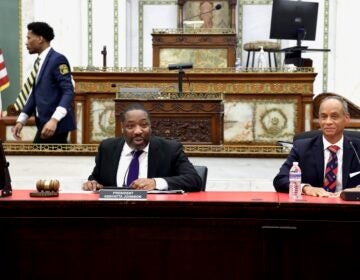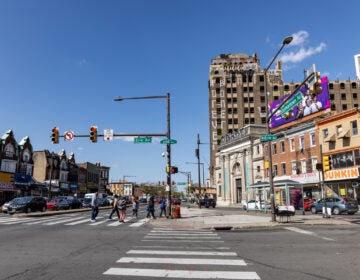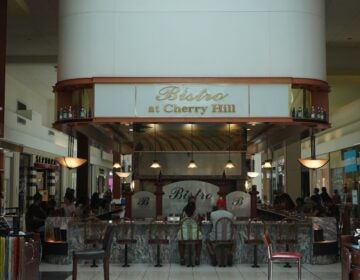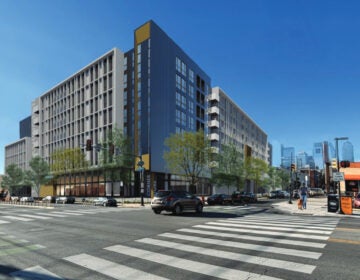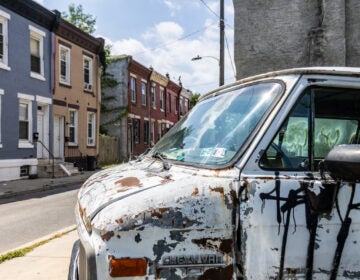A Philly City Council zoning bill could affect hundreds of thousands of properties. Not everyone is on board
Councilmember Jeffrey Young Jr. wants to crack down on property owners who are breaking zoning laws to make a buck. He’s willing to change the zoning code citywide to do it.
Listen 1:11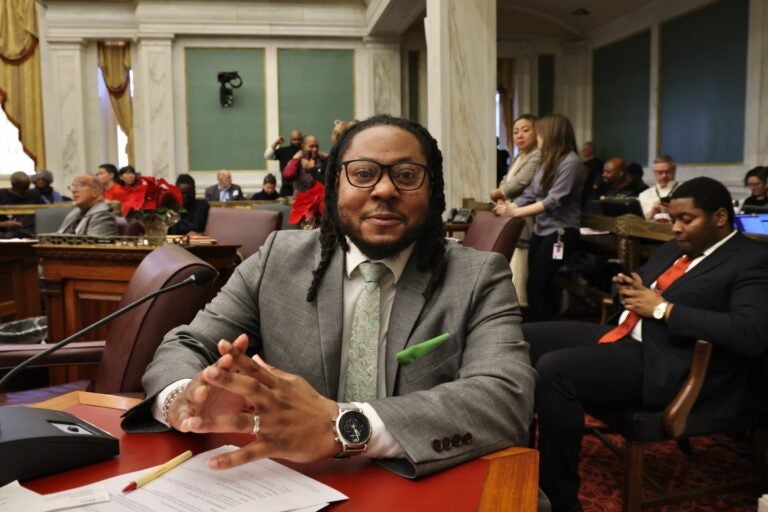
Philadelphia City Councilmember Jeffrey Young Jr. (Emma Lee/WHYY)
Have a question about Philly’s neighborhoods or the systems that shape them? PlanPhilly reporters want to hear from you! Ask us a question or send us a story idea you think we should cover.
A bill in Philadelphia’s City Council proposes a change to a seemingly small and obscure section of the city’s zoning code known as nonconformities. And it could be voted upon by the full Council as early as Thursday.
But this potential change prompted concerns from several groups: city planners, Planning Commission board members and a powerful building industry association board member.
Some argue that such a change could affect hundreds of thousands of properties citywide, put undue burden on small business owners and flood the city’s zoning board with unnecessary cases.
At the core of the concerns is whether the bill would infringe upon a property owner’s ability to do what they want with private land they own.
Despite that opposition, the bill was voted out of committee by City Council this summer and is slated to be voted upon this week, or amended and voted on in the coming weeks. The bill could then become law if signed by Mayor Cherelle Parker. If she didn’t, a majority of Council could override the mayor’s veto by voting in favor of it.
As written, it would go into effect immediately, and there is no sunset provision – that means it would be a permanent change.
The bill’s sponsor is Jeffrey Young Jr., a first-term Philadelphia City Council member for District 5, which includes swathes of Center City near Rittenhouse Square and North Philadelphia close to Temple University.
Young Jr. is an attorney by trade and previously worked as legislative counsel to former Philadelphia Council President Darryl Clarke.
The first-year council member said he sees the issue of nonconformities as a loophole in the city’s zoning code, and he wants to close it. He’s not opposed to giving the city’s enforcement arm, Licenses and Inspections (L&I), more time to implement the zoning change.
“But if it’s something that L&I needs more time to implement, I’m happy to work with them on what that looks like,” Young Jr. said.
The council member said he’s most concerned that, as it stands, property owners are not penalized for illegally converting properties that were once grandfathered in with zoning that does not otherwise conform to the neighborhood.
While the bill would apply to all properties, he offered an example for residential sites in an interview with WHYY News.
“If the property is zoned for a single-family use, but you have a duplex on your property, and you illegally convert that duplex to four units or a rooming house, you should not be able to get the benefit of going back to that duplex when [Licenses and Inspections] comes and gives you a violation,” Young Jr. said. Instead, his proposal puts them back into the zoning process.
The reason a property owner might illegally convert a property for another use rather than obtaining a zoning permit as required by city law could be to save money, to circumvent the community input process or to ensure that in a gentrifying neighborhood the property owner can cash in when the market values have increased enough for a big profit.
Essentially, Young Jr. wants to force all property owners with grandfathered-in properties, whether commercial, industrial or residential, back into the zoning process.
That often means getting a variance from the zoning board, which could open the door for the registered community organization and local neighborhood leaders to weigh in.
A city of … single-family properties
Philadelphia is known as a city of neighborhoods, but in terms of zoning, it’s a city where the vast majority of properties are single-family homes – whether attached as rowhouses or not.
More than 313,500 properties citywide are zoned as single-family dwellings, out of more than 584,000 total properties, according to data from the Office of Property Assessment.
But the city’s property market continues to change. In the past decade, there’s been pressure to convert properties zoned as single-family dwellings into multifamily use – whether condos, apartments or boarding houses that rent by the room.
Because of those market forces, there’s a wave of illegal conversions, where property owners simply renovate the building into the desired purpose without paying the city for permits or following the process that takes into account one’s neighbors through an established system.
That’s why Young Jr. said he wants to try and change the zoning law citywide, to remove the potential reward for property developers who break the rules.
“It’s about trying to tackle illegal conversions in our city and there are illegal conversions in our city every single day,” he said. “There are folks who convert properties from one use to another without going through the proper channels, without getting building permits, without getting a zoning permit. There are a lot of people who are using properties [and] the city does not know that [they] exist.”
Some say bill needs work
But some who have read it don’t think the bill, as it is currently written, would be effective.
“While we are aware of the [bill] sponsor’s intent, there are arguably on the low end, tens of thousands, if not hundreds of thousands, of properties in the city of Philadelphia that have and had obtained legal use permits [that are nonconforming],” said Rachael Pritzker, an attorney who specializes in zoning, during the June committee meeting.
Pritzker, who’s also a former City Council legislative staffer and board member of the Building Industry Association, said the bill needs more work and offered to help. She did not respond to an interview request for this news story.
“The bill as currently written is ambiguous and can have dangerous consequences that go against our city’s goal of keeping wealth in neighborhoods, transparency and providing affordable housing,” Pritzker said.
She shared the experience of a family who passed down ownership of a triplex to their child – a triplex that would be considered nonconforming because it’s zoned as single-family use on the books, though the family has a use permit for apartments.
“Had this legislation been in effect, this family might have had to go through the variance process,” she said. That can cost upwards of $3,000, in addition to attorney fees, she said.
“In most cases, they would have either had no choice but to continue to operate [the triplex] illegally or sold the property as they would not have been able to fight the battle with [Licenses and Inspections] or weather the [Zoning Board of Adjustments] process. This conversation happens all the time,” she said.
The bill was discussed during two separate Planning Commission meetings, where both city planners and commissioners voiced concerns and did not recommend the legislation.
The bill could turn into a city’s planner’s nightmare, said Michael Gall, a senior legislative planner in Philly, during a Planning Commission meeting about the bill.
“Many of our [neighborhood] corridors are full of properties that are physically configured for a use that is not allowed by the underlying base zone,” Gall said. This bill would be “putting an undue burden on commercial corridor managers, small businesses and building owners.”
Retired Planning Commission member Cheryl Gaston is an attorney who specializes in zoning law and was the first to voice concerns about the bill in June.
At that meeting, Gaston questioned whether the bill would immediately be challenged in court by property owners, and said the Pennsylvania Supreme Court had already sided with private landowners in the past on this subject.
Gaston did not respond to an interview request for this news story.
Maria Nixa Gonzalez, president of HACE community development corporation that designs and builds affordable housing in North Philadelphia, concurred with Gaston’s assessment of the bill at that June meeting.
“I think that there has to be very careful thought as we enact any type of restrictions on people’s rights over a parcel of land or a property,” she said. “I think there has to be more thought and discussion and see how this will affect property owners that are in nonconformity. There’s much to be discussed and fine tuned before this should even be considered.”
Aimed at ‘bad actors’
Some Planning Commission members questioned whether the bill was simply a reaction to Mayor Parker’s decision to try and open a medical facility in a former nursing home on the 2100 block of Girard Avenue, inside Councilmember Young Jr. ‘s district, which has been quietly used as a homeless shelter.
The council member said it was not in response to that move and he introduced the bill in May because it was a timely high profile example of something his legislation would prevent.
“I think that was something that people were missing, my intent. And the same thing happened at the Planning Commission,” he said. “A homeless shelter and a nursing home are two totally separate uses. Under this legislation, you will be prohibited from then trying to come back and say, ‘You know what, we’re going to still use it as some kind of medical facility in the future.’ All this bill is trying to do is to protect communities and prevent nuisances from happening.”
While opponents of the bill are concerned that it could set off sweeping changes and jeopardize the legal status of many property owners, Young Jr. said it’s only property owners who are “bad actors” who might suffer and they would have to take action for the ordinance to kick in.
“I think it’s very clear if you have a legal, nonconforming use, that’s great. We’re not touching your legal, nonconforming use,” he said. “But when you decide to change your use from legal nonconforming to something else – then you’ll lose your benefit of having that legal nonconforming use. We are protecting property rights because of that liberal interpretation. But we don’t want to allow property owners to circumvent the processes that have been established for safety reasons and I think that’s what this legislation is trying to prevent.”
“I’ve waited for [the Planning Commission] to provide some clarity, some legislative draft – they have not. I intend to move forward with the legislation with maybe a tweak here and there,” he added.
The purpose section – which is what the Planning Commission highlighted as the issue – was added by the city’s Law Department, Young Jr. says, and is the part most likely to be removed or changed.
Will it pass?
Young Jr. said he’s confident he has enough support on City Council to pass the bill.
“There are folks who misinterpreted it and I think once I explain it to each of my colleagues, they’ll have a better understanding,” he said. “The premise behind this legislation was to capture folks who are doing illegal conversions and then try to revert back to that particular [old] use once they get caught. It [takes] an action of the property owner for this legislation to kick in. So long as the property owners are acting in good faith, this legislation won’t affect them.”
WHYY News contacted all remaining councilmembers about the proposed bill that’s on the Dec. 12 agenda. The response was mixed.
Some council members indicated they would approve the bill if it was amended to exclude their own districts, which means it wouldn’t become a citywide law. Others would approve the bill as it’s written. Some would consider the bill if there are unspecified amendments introduced on Thursday. And some were not in favor at all.
As to whether Mayor Parker would sign this bill into law, that’s unclear.
“We never comment on approved legislation before the mayor makes her determination on any particular bills,” said Joe Grace, a spokesperson for the Parker administration, in an email.

Get daily updates from WHYY News!
WHYY is your source for fact-based, in-depth journalism and information. As a nonprofit organization, we rely on financial support from readers like you. Please give today.



